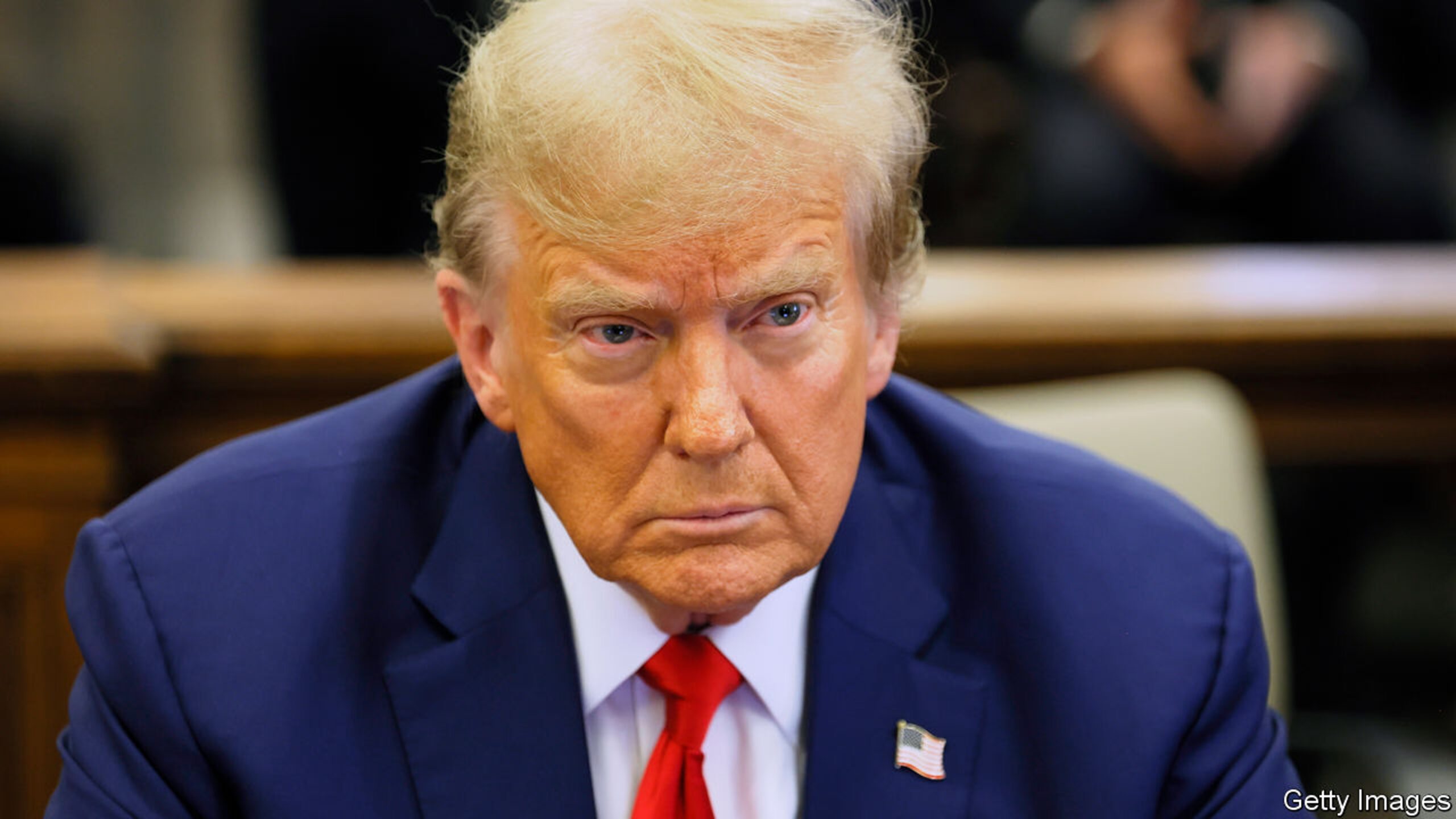IT DOES NOT bode well when a judge, before meting out a punishment, tells a defendant that his lack of remorse “borders on pathological”. Sure enough, that dressing-down of Donald Trump preceded an enormous fine in a civil ruling on February 16th. A judge in New York ordered him and his property business to pay $355m (plus an estimated $86m in interest) for cooking the books over several years. Time and again the Trump Organisation inflated asset values to secure better loan terms, the judge found. New York’s attorney-general, who brought the lawsuit, said Mr Trump had “full knowledge of and responsibility for” the scheme.
Mr Trump called the case a “fraud on me” and promised to appeal. He may have to cough up only a portion of the fine while that is pending—how much exactly will be up to the judge. The penalty comes on top of an $88m award owed to E. Jean Carroll, a writer whom Mr Trump sexually assaulted decades ago and then defamed over the past few years. Mr Trump should be able to pay both without having to sell much in the way of assets: last year in a deposition he said he had “substantially” more than $400m in cash on hand. But there is no escaping the fact that he is personally on the hook. Neither fine can be satisfied with campaign funds, which he has used to cover his lawyers’ fees in his four criminal trials. (The first of those, over hush money paid to a porn star, starts next month in New York.)
The ruling from Judge Arthur Engoron was blistering, and followed an 11-week trial that began in October. The Trump Organisation was found to have overvalued assets by between $812m and $2.2bn from 2014 to 2021. Mr Trump’s repeated refusal to admit wrongdoing turned a “venial sin” into something more nefarious, wrote the judge. The former president and his co-defendants—his two eldest sons and two employees—adopted a “‘See no evil, hear no evil, speak no evil’ posture that the evidence belies”. Nothing short of a complete overhaul of the business would deter them from future misconduct.
The ruling aims to transform how the Trump Organisation operates. Judge Engoron barred Mr Trump from working as a corporate director in New York for three years. His two eldest sons, who are co-chief executives, were each given a two-year ban. An independent monitor appointed in 2022 to babysit the firm will have her remit expanded for at least three more years. An independent compliance officer will come aboard. And the company will not be allowed to seek loans from any lender registered in New York for three years (most reputable ones had anyway stopped doing business with it long ago). Appellate courts will probably pause the order while they consider Mr Trump’s appeal; that process could take two years or more.
Yet the ruling also contained a reprieve from one of Judge Engoron’s previous decisions. In September, in a pre-trial order, he demanded the cancellation of corporate charters that allow the firm to operate in New York. That was a death knell, since it would have meant the liquidation of the business. After Mr Trump’s lawyer asked Judge Engoron whether that was truly his intention the judge said he would think about it, and on February 16th he walked it back, calling the termination of the business licences “no longer necessary”.
The lawsuit unearthed some embarrassing stuff. Each year Mr Trump announced his desired net worth to his lieutenants, who would then reverse-engineer asset values to achieve it. He reported his own triplex apartment in Manhattan as having three times its actual square footage. Mr Trump’s defence throughout the trial—that outside accountants had certified the financial statements, and that no bank suffered losses on account of the misreported valuations—got no traction with the judge. Letitia James, New York’s attorney-general, said Mr Trump’s lenders could have made $168m more had they not been tricked into charging him preferential interest rates.
Her allegations were numerous enough, yet still the case against Mr Trump kept mounting in recent months. Midway through the trial, the monitor overseeing the Trump Organisation noted that not long ago it made an undisclosed cash transfer of $29m to Mr Trump. The firm’s records were “incomplete”, the monitor added.
Most damaging of all, though, was Mr Trump’s own behaviour during the trial. He repeatedly insulted Judge Engoron’s clerk on social media. That prompted the judge to bar him from making statements about her—a gag order Mr Trump duly violated, incurring fines worth $15,000. Mr Trump could not stop himself from attacking Judge Engoron either. “I know this is boring for you,” he scolded the judge while delivering his own defence during closing arguments. “You have your own agenda, I can certainly understand that. You can’t listen for more than one minute.”
In his ruling, Judge Engoron described how he paid close attention to every witness: their expressions and demeanour and body language. All that influenced his decision, and shed light on each player’s self-interest, common sense and credibility. On the last point Mr Trump was “severely compromised”.
Whether Mr Trump is compromised politically by the ruling is another matter. As with his multiple other legal troubles, he is using the affair as an opportunity to attack “corrupt” Democrats for “election interfering”. Appearing on the steps of his home at Mar-a-Lago after the ruling, he accused President Joe Biden of “a witch hunt against his political opponent the likes of which our country has never seen before”. ■

 Blog Post6 days ago
Blog Post6 days ago
 Accounting1 week ago
Accounting1 week ago
 Economics1 week ago
Economics1 week ago
 Personal Finance1 week ago
Personal Finance1 week ago
 Economics1 week ago
Economics1 week ago
 Personal Finance1 week ago
Personal Finance1 week ago
 Accounting1 week ago
Accounting1 week ago
 Finance1 week ago
Finance1 week ago



















